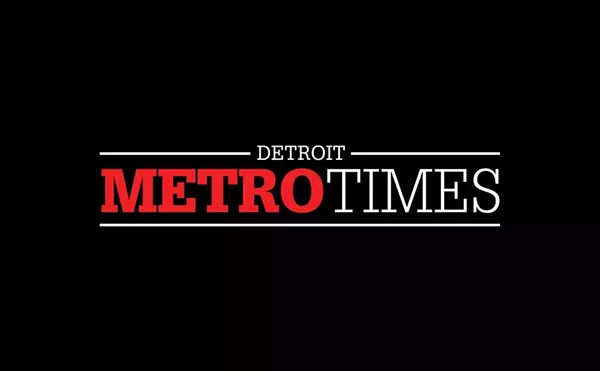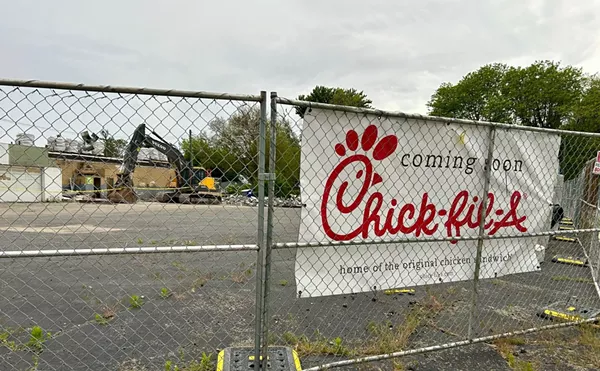
Audio By Carbonatix
[
{
"name": "GPT - Leaderboard - Inline - Content",
"component": "35519556",
"insertPoint": "5th",
"startingPoint": "3",
"requiredCountToDisplay": "3",
"maxInsertions": 100,
"adList": [
{
"adPreset": "LeaderboardInline"
}
]
}
]
Never do we turn down an open bar. Never. Particularly one where the tab is picked up by a huge, greedy marketing concern like a major record company. (Yeah, yeah, I know — blaming a major label for greed is like blaming a hog for rolling in shit; it’s what they do. Money and exploitation are labels’ reasons for existing.)
The open-bar invite featured a pic of a Dreamworks band called Loudermilk. The band, in all its Strokes-cum-mod-garage glit, appeared wrapped in so much Who Live at Leeds glory that we half expected something passable. We thought we’d get four-chord pop anthems with readymade chorus shout-outs, a backward-gazing blur of hopeful pop fun.
We did get drunk.
Step one in purchasing a band a buzz: Buy out a local venue for an evening show. Send out impressively designed invites to record store employees, media flacks and press goobs. Impress guests with free swag and booze. Get some standard all-ages-show kids — preferably in oversize concert T-shirts and dirty Converse — to feign interest in the band, to stand in front of the stage and nod heads and clap along in unison. Make sure the band is decked to the nines and exercises every current alternative-rock cliché that’s oozing up through the cracks of pop.
Loudermilk is just Dreamworks’ latest go-out-and-purchase-a-buzz band. Another Dreamworks band you won’t recall, Ours, found its way to the Top 40 via said formula.
In attendance at the Shelter were 30 or so mostly indifferent-looking chubby white guys and six kids who obviously had been bribed into attending.
Dreamworks believes — often correctly — that it can forgo years of band struggle by simply tossing enough cash around, that enough dough will seal the envelope of success.
Loudermilk came on, posing as 1960s proletarian English white kids playing dress-up, and played to a bored set of faces.
Sadly, Loudermilk was just sour, just four joyless sacks that — besides strutting in the emperor’s new clothes — gave off a completely ungrateful air. No fun, no smiles, no rock ’n’ roll chutzpah. Loudermilk displayed the kind of yuppie haughtiness that says greed is the new posture passing itself off as attitude. It was like being at a birthday party for privileged rich kids. The group displayed none of the naïveté and charm of a baby pop band just finding its legs; rather, it had an implied arrogance — the kind that only a seasoned band can earn, a band that had already put in the years and the apprenticeship to hone its songwriting and presentation.
What’s more, Loudermilk’s inability to live up to the idols it aped was as sickening as it was predictable. The band’s Nicklebackish set of chorus-free dirge belied its neo-Strokes imagery.
Loudermilk is the spot-on archetype of a band produced by a culture in the grip of retail and advertising; the band perpetrates a market-designed cultural model. You can hear the A&R brainpan that churned into focus-group hyper-drive when it signed this Seattle-based quartet: “Let’s see, we’ll get a band and dress ’em up cool and garage-y like the Strokes, ’cause the kids are getting into that now, but we’ll ensure that they sound closer to Linkin Park and Nickelback, bands that really sell shitloads of records.”
In rock ’n’ roll, in hip hop, in rap, in whatever it is, kids don’t realize that they are being blatantly manipulated by an ethic which says that cool can easily be manufactured. I would hope that most kids would take one look at Linkin Park (whose singer once did time in a hippie band, playing in dreads and bare feet) or Nickelback and Loudermilk and go, “We’re being taken for granted and manipulated and these dudes fuckin’ blooooow!”
I’m a sucker for things that exhibit a sense of rock ’n’ roll style and grace — a gold-top Les Paul; a sparse, vintage drum kit; a Thunderbird bass; a Ron Wood power-shag; anything that suggests a nod to what came before, that which suggests an effort toward the songwriting.
But Loudermilk appropriates the iconic imagery without bringing in anything of its own.
By set’s end, Loudermilk frontman Davey Ingersoll had tossed his $1,500 Gibson SG into the air with a facial grimace that suggested angst and rage. How rock!
What’s Ingersoll angry about? Is he pissed because he knows he’s completely bought and paid for?
I can think of 10 bands that can’t even afford a publicist whose records simply jump out of the speakers, rile the soul with genuine wit and charge and fun. Bands that reaffirm the belief that we cannot become so jaded that we no longer feel anything. That we still believe in the goose bumps and the power and glory of the perfect three-minute pop song. That music can still work on all levels — even if it keeps showing itself to be an art form left over from the last century.
The whole idea of purchasing a “buzz” is simply seducing the consumer with inviting treats; fun packaging, the right haircut, free drinks. It is where pop music is no longer a place for new ideas or passion, but one for cynically recycling old ones.
Loudermilk is composed of four guys lucky enough to be playing venues across the country greased with major-label dough and swag. Onstage at the Shelter was $30,000 worth of gear. We drank at least $60 worth of booze in the hour we were there.
A band like Jimmy Eat World, on the other hand, is textbook rock ’n’ roll with an integrity that isn’t yet archaic. The band carved a career the old-fashioned way, by taking the music to the kids. They toured the country in a smelly van for months on end. They slept on floors and fast-food wrappers and played every sweaty basement, keg party and all-ages show between Tijuana, Mexico, and Portland, Maine. And the kids caught on.
A few nights later I saw the Hives, and it was Loudermilk with a crowd: Champs at the art self-congratulation; all hype and good suits with no songs. The Hives, however, were almost redeemed by the band’s lithesome front man, a guy who recalls the antiquated idea that fronting rock ’n’ roll is supposed to be about fun, explosive gyrations and sexual tension for little girls, even if he did trade on every pre-Exile chicken-butt Jagger move.
Dee Dee Ramone died the day after the Loudermilk gig, and for a brief moment everything made perfect sense. Dee Dee and the Ramones perfected the idea of the pop song, trimmed the blubber — only to have it misappropriated to huge financial gain by countless others, from Green Day and Sum 41 to the Hives and (maybe) Loudermilk. History has proved that Dee Dee — the main writer in the Ramones — was right.
Still, Dee Dee was a real-life mixture of the raw and the baked, who gave it his all and managed to somehow last 50 years doing so. His life was a unsettling mix of stubborn endurance and acquiescence born of years of dope damage and rock ’n’ roll mythology.
Without the Ramones, there would have been no punk rock. And without punk rock, life would have been very different. The Ramones was my first-ever rock ’n’ roll show, a set played in hailstones of spit and hate in front of 15,000 people who wanted the band dead. But the show was fucking heroic. Even as a little kid, I understood. That Ramones show changed my life. It had that kind of power.
Rock ’n’ roll, by design, is/was supposed to have that kind of authority and clout. How did we let it get so cozy and soft and suburban white? How did it beget Loudermilk? How did it produce the Hives?
Brian Smith is Metro Times’ music editor. E-mail him at bsmith@metrotimes.com




